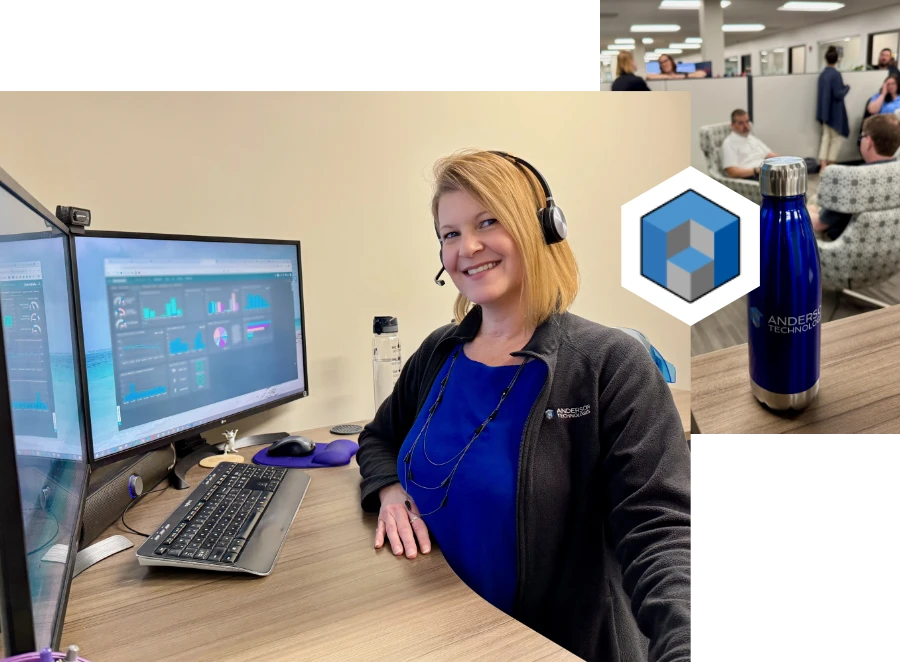What Security Does a Firewall Provide?
“When Anderson Technologies stepped in to help, you and your talented, dedicated team brought us completely up to speed, and we now feel technologically safe, secure and in capable hands.”
– L.G., Executive Director, Non-profit Organization
What Is Firewall Security?
You may be familiar with the term “fire wall” as a wall inside a building that is made specifically to protect something from fire. In IT, firewall security fulfills a similar purpose, except the fire is the myriad cyberthreats trying to break through your cybersecurity. Implemented correctly, firewall security can even protect two different parts of your network from each other.
There are two types of network security firewalls: hardware firewall and software firewall. While most people have used a software firewall, which is a program that is installed on a single workstation that protects the machine from within the network, your primary defense should actually be a hardware firewall. Like the fire wall that protects your office building, this is a physical device that is programmed to stop a threat before it even gets into the network.

A hardware firewall protects not just computers, but printers, servers, and any other device on the network. It is constantly on guard against intruders and puts up a good defense by acting as a gatekeeper, blocking unauthorized access to the network. When a hardware firewall is configured correctly, input from your IT provider informs the hardware what is safe and what is not, and it combats the threats while allowing the authorized users to access what they need.
Enterprise-grade firewalls permit each user account to be configured and managed, allowing for specific securities per user. This provides different levels of access to confidential data and tells your firewall how to act in regards to usage.
While a hardware firewall is meant to protect your network from the outside, it’s always best to have a layered security system, just in case one element fails. This is where a software firewall comes into play.
A software firewall is an application on your computer or server that alerts the user or IT manager to any problem, if a security risk gets through the hardware firewall. This is what many people associate the term firewall with and would recognize on their computers. Windows Defender Firewall, or any firewall program that comes with an operating system is considered a software firewall.
Why Is a Hardware Firewall Important?
The problem with having a software firewall without a hardware firewall is that by the time it has been flagged by the software firewall, the attack is already inside your network. Think of a hardware firewall as a security guard that keeps people from entering the building, while a software firewall is the alarm system that goes off only when the door opens. By the time the software firewall is activated, the hacker or malware has full access to your system until the problem is resolved.
It’s not enough to simply have hardware and software firewalls, though. Both need to be continually updated, patched, and managed to handle the constantly evolving and increasingly sophisticated cyberthreats.
In combinations with other security measures, an enterprise-grade firewall can help your business fulfill security standards §164.308(a)(4) Information Access Management and §164.312(a)(1) Access Control of the HIPAA Security Standards. It also provides traffic logs that can help you audit (§164.312(b)) your network activity or find the source of a breach should one occur (§164.308(a)(6)).
How Do Firewalls Help HIPAA Compliance?
User- or Role-defined authorization and authentication are crucial aspects of HIPAA compliance, as well as newer cybersecurity architecture, such as the Zero Trust model. Having the hardware capable of performing these type of security checks helps ensure that the only people accessing your data are your employees. An enterprise-grade firewall is part of a thorough and complete HIPAA compliancy program.
Having a software firewall without a hardware firewall is not secure. Your business has sensitive, irreplaceable data, and protecting it from attack and unauthorized access is critical. Malicious actors can find entry points, or your employees could unwittingly download a virus, ransomware, or other malware, which can jeopardize your company for days or weeks. Unauthorized access to your network can also mean serious downtime from cyber attacks, halting business function and doing permanent damage to your reputation and the relationship you have with your clients. For many industries, a breach means automatically reporting to the government and coping with the consequences.
A lot of businesses worry that a firewall will impede their employees’ ability to do their jobs by slowing the network. If a firewall is poorly implemented, this could be a valid concern. Firewalls installed with limited configuration and the manufacturer’s defaults abound with cybersecurity vulnerabilities, unnecessary exposure, and business risks—and with it comes frustration from a slow “bottlenecked” connection. Firewalls should be tailored to your particular business environment to provide maximum security with optimal functionality. A well-configured firewall combines security with productivity without sacrificing one for the other.
Firewall security is essential and acts as a barrier between your network and a variety of threats, including the threat of human error. Anderson Technologies emphasizes employee education for the clients we serve, but mistakes happen no matter how well-versed in cybersecurity your employees may be. One errant click can instantly create a vulnerability in your network, but firewalls provide a safety net.
Don’t put your company at risk by thinking a firewall won’t be efficient. Work with your IT company to make sure you’re protected from every angle.
A Free IT Assessment Can Help You Identify Risks
Your organization is too valuable to not have modern IT systems to keep it safe and make it scalable. A free Anderson Technologies IT Assessment will identify where you are the most vulnerable and recommend the areas to address first, affording you the most protection and peace of mind.

